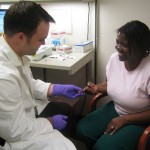PATIENT-CENTERED CARE is intrinsic to good outcomes and requires a multidisciplinary, team-based approach. At North Mississippi Medical Center’s (NMMC) Family Medicine Residency Center in Tupelo, a special program ensures that family practice residents have access to the medication knowledge and experience of pharmacists. And the results have been extraordinary.
J. Edward Hill, M.D., faculty member in the family medicine residency program and a past president of the American Medical Association, is a big fan of the program. “Having a pharmacist in a clinic like this, working side-by-side with residents every day, is the most exciting thing for patient care and resident education I’ve ever seen,” he said.
As part of the program, each class of eight first-year residents inherits a panel of patients from the graduating class before them. They then follow the patients throughout the three years of their residencies as the patients transition through clinic visits, hospital admissions and discharges, and extended care facilities.
Positively Impacting Residents’ Learning Process
James L. Taylor, Pharm.D., the primary care pharmacy manager at the Center, guides residents on medication management every step of the way.
“I serve as a source of information to residents and do one-on-one consults, both in chronic care services and on transitional care services,” Taylor said. “For example, if the residents want to start someone on insulin, they ask me to do the initial education as well as the follow-up and titration. When the residents go on rotation, I’m their back-up in talking to patients when they’re not available.”
Having access to a pharmacist who can provide this kind of oversight has dramatically changed patient care at NMMC, according to Dr. Hill.
“On a daily basis, James catches things that could turn out to be errors or safety issues. He has had a major impact on the residents’ learning cycle and dramatically improved the care they provide,” he said.
Ensuring Comprehensive Care
Taylor, who works alongside a licensed social worker and five fellow faculty members and clinicians, draws upon his work as a pharmacist to provide residents with practical pointers that will enhance care. For example, Taylor understands the various insurance plans that the clinic’s patients have based on his work getting prior authorizations for various treatments. This knowledge has made him cost-sensitive, which he stresses to the residents.
“If a patient can’t afford the medications they’re prescribed, we’ve done them no good. So, I like to impress upon the family practice residents that they should be aware of the formulary coverage issues and costs of drugs available to the patients,” Taylor said. “If we could do this in every clinic, we would cut down on call-backs to the clinic that retail pharmacists need to make if a prescription is not covered, and our patients would be better served.”
Taylor has worked extensively with teams of physicians and administrators in the NMMC system to determine the safest and best ways to discharge patients and transition them through the care continuum. Taylor’s efforts help reduce readmissions and increase clinic follow-up, and he builds upon this success by passing proven care strategies along to the residents.
“We’ll make follow-up calls within two business days of hospital discharge to make sure patients have follow-up appointments, and we counsel them on their concerns,” Taylor said. “Residents learn how to question patients to get the right information about whether they are taking their medications correctly, and if not, why not.”
Kristi M. Gholson, Pharm.D., FASHP, director of pharmacy for the family medicine residency program, emphasized the program’s forward-thinking approach. “The residents may end up practicing somewhere that doesn’t have access to pharmacists the way they have now. We won’t be there to do this [kind of work] for them, so we teach them our way of thinking.”
A Welcome Addition
Feedback from both current and former residents has been overwhelmingly positive, said Gholson. “Some of them have said that they would never want to work in a clinic that didn’t have a pharmacist.”
Indeed, several former residents still reach out to Taylor for advice. “Hopefully, I’ve given them some things to think about when they are out there on their own, practicing evidence-based medicine and balancing cost considerations, so they can make the right choices for their patients.”
We need someone who has a broad knowledge of all medications, and that’s what pharmacists bring to us and to our patients. — J. Edward Hill, M.D.
That Taylor still hears from former residents is testimony to the value of pharmacists’ training and expertise, said Gholson.
“It shows that there’s a need for our knowledge. As a profession, we have to continue to market ourselves. We need to differentiate our skills and expertise from those of other members of the healthcare team.”
Dr. Hill said that physicians should welcome pharmacists as integral members of the care team.
“We often know enormous amounts about the medications in our particular specialties, but we need someone who has a broad knowledge of all medications, and that’s what pharmacists bring to us and to our patients.”
—By Terri D’Arrigo










 If you want to contribute tutorials, news or other stuff please contact us. We pay 150 for each approved article.
If you want to contribute tutorials, news or other stuff please contact us. We pay 150 for each approved article. Consectetur adipisicing elit. Sed do eiusmod tempor incididunt ut labore.
Consectetur adipisicing elit. Sed do eiusmod tempor incididunt ut labore. This site uses valid HTML and CSS. All content Copyright © 2010 Newscast, Inc
This site uses valid HTML and CSS. All content Copyright © 2010 Newscast, Inc If you like what we do, please don't hestitate and subscribe to our
If you like what we do, please don't hestitate and subscribe to our